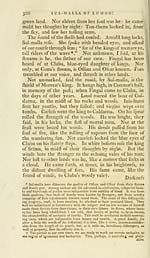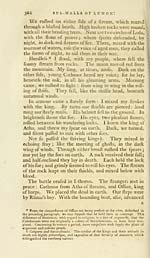Download files
Complete book:
Individual page:
Thumbnail gallery: Grid view | List view

A POEM. 361
Darknefs dwells In Cliiba of harps: the race of kings is
diflant far; in battle is Conmor of fpears; and Lormor*
king of ftreams. Nor darkening alone are they ; a beam,
from other lands, is nigh : the friend f of flrangers in
Atha, the troubler of the field. High, from their mifty
hill, look forth the blue eyes of Erin, for he is far away,
young dweller of their fouls. Nor, harmlefs, white hands
of Erin I is he in the Ikirts of war; he rolls ten thoufand
before him, in his diftant field.
Not unfeen by Offian, I faid, rufiied Gathmor from his
ftreams, when he poured his ftrength on I-thorno |, ifle of
many waves. In llrife met two kings in 1-thorno, Cul-
gorm and Suraft-dronlo: each from his echoing iile, flera
hunters of the boar I
They met a boar, at a foamy fi:ream : each pierced it
with his fteel. They llrove for the fame of the deed :
and gloomy battle rofe. From ifle to ifle they fent a fpear,
broken and fiained with blood, to call the friends of their
fathers, in their founding arms. Cathmor came, from
Bolga, to Culgorm, red-eyed king: 1 aided Suran-dronlo,
in his land of boars.
We
dices too far. It has been long remarked, that knowledge, in a great meaRirr,
!S founded on a free intercourse between mankind; and that the mind is enlarg-
ed in proportion to the obfervations it has made upon the manners of different
men and nations. If we look, with attention, into the hiftoiy of Fingal, as de-
livered by Oiiian, we (liall find that he was not altogether a poor ignorant hunt-
er, confined to the narrow corner of an iiland. His expeditions to all parts of
Scandinavia, to the north of Germany, and the different ftates of Great Britain
and Ireland, were very numerous, and performed under fuch a charailer, and
at iuch times, as gave him an opportunity to mark the undifguifed manners of
mankind. War, and an a<Sive life, as they call forth, by turns, all the powers
of the foul, prefent to us the diftei'ent charafters of men ; in times of peace and
^uiet, for want of objefls to «xert them, the jwuers of the mind lie concealed, in
a great meafure, and we fee only artificial pafllons and manners. It is from thisj,
confideration I conclude, that a traveller of penetration could gather more genu-
ine knowledge from a tour of ancient Gaul, than from the minuteil oblervatioii
of all the artificial manners, and elegant refinements of modern France.
• Lormor was the fon of Conmor, and the brother of Sul-malla. After the
death of Conmor, Lormor iucceeded him in the throne.
f Cathmor, the fon of Borbar-duthul. It would appear, from the partialit7
with which Sul-malla fpeaks of that hero, that Ihe had feen him, previous to bis
Joining her father's army ; though tradition pofitively afferts, that it was, after
his return, that Ihe fell in love with him.
\ I-thorno, fays tradition, was an ifland, of Scandinavia. In it, at a hunting
party, met Culgorm and Surun-dronlo, the kings of two neighbouring ifles. They
differed about the honour of killing a boar; and a war was kindled between
them. From this epifode we may learn, that the manners of the Scandinaviar.a
•were much more lavage and cruel, than thofe of Britain. It is remarkable, that
the names, introduced in this flory, are not of Galic original, which circurailanc«
affords room to fuppofe, that it hai i;: foundation iu true biltor:.
Darknefs dwells In Cliiba of harps: the race of kings is
diflant far; in battle is Conmor of fpears; and Lormor*
king of ftreams. Nor darkening alone are they ; a beam,
from other lands, is nigh : the friend f of flrangers in
Atha, the troubler of the field. High, from their mifty
hill, look forth the blue eyes of Erin, for he is far away,
young dweller of their fouls. Nor, harmlefs, white hands
of Erin I is he in the Ikirts of war; he rolls ten thoufand
before him, in his diftant field.
Not unfeen by Offian, I faid, rufiied Gathmor from his
ftreams, when he poured his ftrength on I-thorno |, ifle of
many waves. In llrife met two kings in 1-thorno, Cul-
gorm and Suraft-dronlo: each from his echoing iile, flera
hunters of the boar I
They met a boar, at a foamy fi:ream : each pierced it
with his fteel. They llrove for the fame of the deed :
and gloomy battle rofe. From ifle to ifle they fent a fpear,
broken and fiained with blood, to call the friends of their
fathers, in their founding arms. Cathmor came, from
Bolga, to Culgorm, red-eyed king: 1 aided Suran-dronlo,
in his land of boars.
We
dices too far. It has been long remarked, that knowledge, in a great meaRirr,
!S founded on a free intercourse between mankind; and that the mind is enlarg-
ed in proportion to the obfervations it has made upon the manners of different
men and nations. If we look, with attention, into the hiftoiy of Fingal, as de-
livered by Oiiian, we (liall find that he was not altogether a poor ignorant hunt-
er, confined to the narrow corner of an iiland. His expeditions to all parts of
Scandinavia, to the north of Germany, and the different ftates of Great Britain
and Ireland, were very numerous, and performed under fuch a charailer, and
at iuch times, as gave him an opportunity to mark the undifguifed manners of
mankind. War, and an a<Sive life, as they call forth, by turns, all the powers
of the foul, prefent to us the diftei'ent charafters of men ; in times of peace and
^uiet, for want of objefls to «xert them, the jwuers of the mind lie concealed, in
a great meafure, and we fee only artificial pafllons and manners. It is from thisj,
confideration I conclude, that a traveller of penetration could gather more genu-
ine knowledge from a tour of ancient Gaul, than from the minuteil oblervatioii
of all the artificial manners, and elegant refinements of modern France.
• Lormor was the fon of Conmor, and the brother of Sul-malla. After the
death of Conmor, Lormor iucceeded him in the throne.
f Cathmor, the fon of Borbar-duthul. It would appear, from the partialit7
with which Sul-malla fpeaks of that hero, that Ihe had feen him, previous to bis
Joining her father's army ; though tradition pofitively afferts, that it was, after
his return, that Ihe fell in love with him.
\ I-thorno, fays tradition, was an ifland, of Scandinavia. In it, at a hunting
party, met Culgorm and Surun-dronlo, the kings of two neighbouring ifles. They
differed about the honour of killing a boar; and a war was kindled between
them. From this epifode we may learn, that the manners of the Scandinaviar.a
•were much more lavage and cruel, than thofe of Britain. It is remarkable, that
the names, introduced in this flory, are not of Galic original, which circurailanc«
affords room to fuppofe, that it hai i;: foundation iu true biltor:.
Set display mode to: Large image | Transcription
Images and transcriptions on this page, including medium image downloads, may be used under the Creative Commons Attribution 4.0 International Licence unless otherwise stated. ![]()
| Early Gaelic Book Collections > Ossian Collection > Poems of Ossian, the son of Fingal > (315) |
|---|
| Permanent URL | https://digital.nls.uk/77586241 |
|---|
| Description | Selected books from the Ossian Collection of 327 volumes, originally assembled by J. Norman Methven of Perth. Different editions and translations of James MacPherson's epic poem 'Ossian', some with a map of the 'Kingdom of Connor'. Also secondary material relating to Ossianic poetry and the Ossian controversy. |
|---|
| Description | Selected items from five 'Special and Named Printed Collections'. Includes books in Gaelic and other Celtic languages, works about the Gaels, their languages, literature, culture and history. |
|---|

